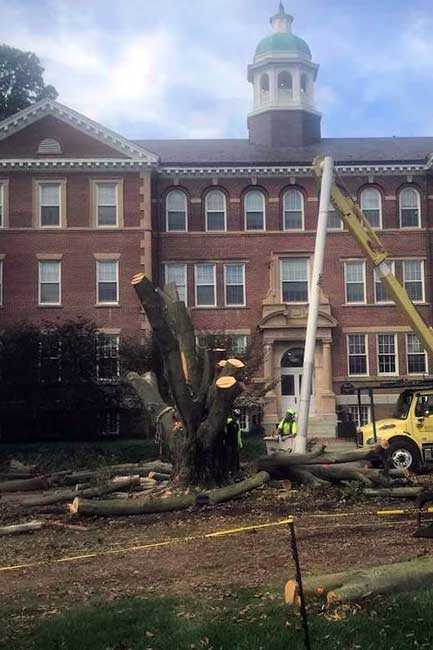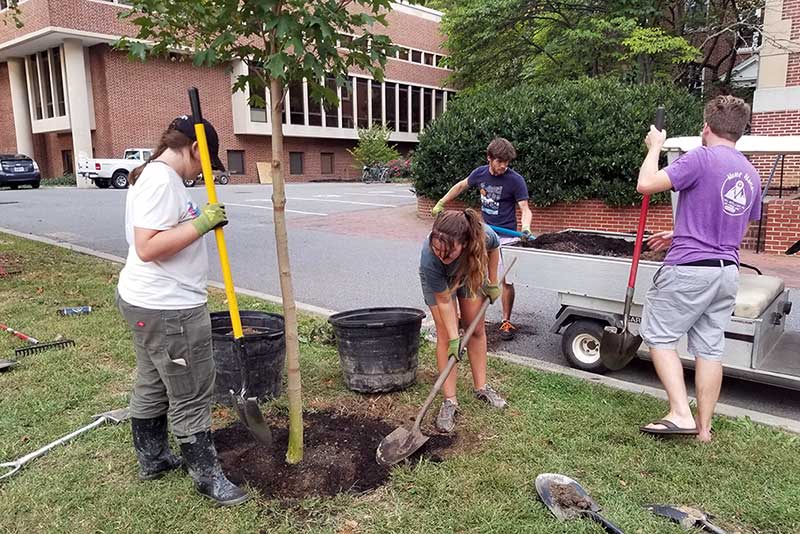Farewell to a Beech Tree
By Alaina Perdon '22
Oct. 7, 2021
How do we assign value to a tree? One might suggest we collect our DBH tape and a log scale stick to count how many two-by-fours we could stock hardware store shelves with. Whether we know its scientific name and preferred soil type or we like the way its leaves dance in the wind and change color in the autumn, a tree holds a different meaning for each of us.
The American beech tree that once shaded the east edge of the lawn in front of Bill Smith Hall has been felled. To the lichens and the beetles, the beech was a universe of its own, a stronghold for shelf fungi and a sanctuary for a Carolina wren. For the chemistry student biding late nights in Toll, it was a marker indicating two minutes until falling into a warm bed. To the adventurous lot, a perfect vantage point for keeping watch over the passers-by. To you, perhaps, it was a shady spot for a nap or first base in a spontaneous game of whiffle ball. To me, it was a solid backrest while finishing a novel and the 12:20 post-class rendezvous point.
For years, the beech watched over our shuffles to class, late night strolls back from off-campus parties, our goodbye kisses. It became a living museum, each ring inside another page in the ever-growing anthology of the lives of Washington College. Even as it ceases to be tree and becomes wood, it protects our secrets, our warmest memories, our dreams planned out under its canopy.
How do we honor a tree? Do we erect a sign, a monument to remember its image? Do we gather its fallen branches to create something better suited to stand the test of time?
Perhaps you took a second look at an old photo and spotted the beech tree in the background, recalling fondly spring days gone by. Or perhaps you drew up a plan to preserve fragments of the tree as souvenirs of the community built around it. Perhaps it might compel you to reflect, to appreciate the trademarks of our shared history.
We lost an American beech tree: a habitat structure, an aesthetically-pleasing setting, an appreciated patch of shade. But while a tree can be so many things both in and after its life, this tree may best serve us as a reminder of resilience and of togetherness. The tree no longer stands on our campus, but around the gap it left, a college still flourishes. Relationships are still forged, accomplishments celebrated, and the image of our beech tree will now serve as a symbol of our community.
Perhaps it was but a beech tree, but perhaps a beech tree is worth a great lot.
Alaina is an environmental studies major with minors in anthropology and Chesapeake Regional studies, passionate and curious about the intersections of history, culture, and ecology. Through her writing, art, and — hopefully — future career path, she hopes to inspire her fellow humans to embrace their role in the environment. You can often find her chasing after toads or pondering trees' emotional capacities.
 The American beech tree outside of William Smith Hall was removed after storm damage
on Sept. 16. Its wood will be made into furniture by
The American beech tree outside of William Smith Hall was removed after storm damage
on Sept. 16. Its wood will be made into furniture by  On Oct. 8, the
On Oct. 8, the